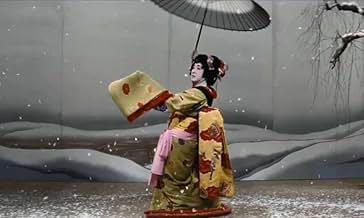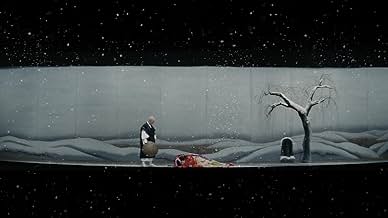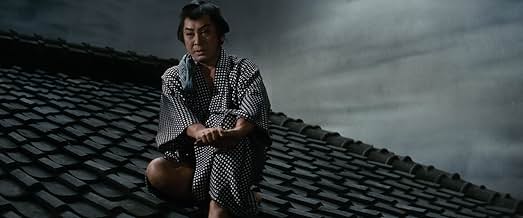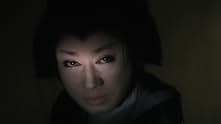IMDb RATING
7.3/10
3.1K
YOUR RATING
Yukinojo, a Kabuki actor, seeks revenge by destroying the three men who caused the deaths of his parents. Also involved are the daughter of one of Yukinojo's targets, two master thieves, and... Read allYukinojo, a Kabuki actor, seeks revenge by destroying the three men who caused the deaths of his parents. Also involved are the daughter of one of Yukinojo's targets, two master thieves, and a swordsman who himself is out to kill Yukinojo.Yukinojo, a Kabuki actor, seeks revenge by destroying the three men who caused the deaths of his parents. Also involved are the daughter of one of Yukinojo's targets, two master thieves, and a swordsman who himself is out to kill Yukinojo.
- Awards
- 1 win total
7.33.1K
1
2
3
4
5
6
7
8
9
10
Featured reviews
Tragic crust with a playful center
Yukinojo Henge, or "An Actors Revenge" in English can be appreciated on a number of different levels. First of all there is the intricate plans of revenge the kabuki actor main character carries out against those who had been responsible for his parents deaths. Secondly one can enjoy it as a period piece. Those interested in Tokugawa Period Japan will enjoy critiquing the historical accuracy of the film. However what really separates this movie from other tales of revenge and intrigue is in its playfulness.
The movie was considered a tribute to the actor who played the part of the lead. It was Kazuo Hasegawa's 300th role and the movie was a remake of the 1935 film of the same name. In many scenes you can see Hasegawa injecting himself as an actor into the movie. These can usually be picked up only if one is somewhat familiar with the behind the scenes aspects of the film. If one is aware that Hasegawa is not only playing the main character, but also that of Yamitaro the thief then there are certain parts of the dialogue that take on a new meaning.
One example of this is when Hasegawa playing the thief witnesses Hasegawa playing Yukinojo Nakamura lying to his love interest and pawn Namiji. After seeing this Yamitaro comments to himself, and also to the audience, that Nakamura is such a great actor, referring to his lies, that he shouldn't be wasting his time with his kabuki troop. Since we as viewers are aware that we are seeing a movie, as well as being aware that the one being commented on is the same as the one doing the commenting, we can see this as Hasegawa making his presence as the actor Hasegawa known. He is essentially complimenting himself saying, "I am such a great actor, why am I wasting my time doing this movie?" There are a couple more instances of similar playfulness between the three part relationship of Hasegawa as Hasegawa the actor in the reality of the film audience, Hasegawa as Nakamura the actor in the reality of the characters, and Hasegawa as Yamitaro. In one scene Yamitaro explains that the reason he is aiding Nakamura in his quest is because he has come to feel a kinship with him as if he were his brother, again playing on the audience's knowledge that the two "brothers" are played by the same person.
Another example of how playful the film is can be seen in its cinematography. The main character is a kabuki onnagata, or a male actor who specializes in playing female roles. There are a couple of scenes in the movie that play up on this fact and shoot the movie in a fashion that provides the audience with the feeling that they are watching a kabuki play. In one example there is a swordfight in a forest. Even though the movie is made in the 1960s when it would have been very possible to have realistic looking backgrounds, the trees do not look real at all. This makes the forest in which they are fighting feel more like a theater set than an authentic landscape. During this swordfight an onlooker says to herself that it is better than watching one on a kabuki stage. Since the audience is aware of the fake scenery, the characters role as an onnagata, and some would even know that the actor himself was once an onnagata, the comment takes on a whole new life than were it an onlooker in a basic action movie watching a scene and saying, "wow that was even cooler than in the movies!" With all of these inside jokes between the actors and the film audience that the characters are not aware of, the movie becomes much more interactive and thus more enjoyable for someone looking for a fun multi-layered movie.
The movie was considered a tribute to the actor who played the part of the lead. It was Kazuo Hasegawa's 300th role and the movie was a remake of the 1935 film of the same name. In many scenes you can see Hasegawa injecting himself as an actor into the movie. These can usually be picked up only if one is somewhat familiar with the behind the scenes aspects of the film. If one is aware that Hasegawa is not only playing the main character, but also that of Yamitaro the thief then there are certain parts of the dialogue that take on a new meaning.
One example of this is when Hasegawa playing the thief witnesses Hasegawa playing Yukinojo Nakamura lying to his love interest and pawn Namiji. After seeing this Yamitaro comments to himself, and also to the audience, that Nakamura is such a great actor, referring to his lies, that he shouldn't be wasting his time with his kabuki troop. Since we as viewers are aware that we are seeing a movie, as well as being aware that the one being commented on is the same as the one doing the commenting, we can see this as Hasegawa making his presence as the actor Hasegawa known. He is essentially complimenting himself saying, "I am such a great actor, why am I wasting my time doing this movie?" There are a couple more instances of similar playfulness between the three part relationship of Hasegawa as Hasegawa the actor in the reality of the film audience, Hasegawa as Nakamura the actor in the reality of the characters, and Hasegawa as Yamitaro. In one scene Yamitaro explains that the reason he is aiding Nakamura in his quest is because he has come to feel a kinship with him as if he were his brother, again playing on the audience's knowledge that the two "brothers" are played by the same person.
Another example of how playful the film is can be seen in its cinematography. The main character is a kabuki onnagata, or a male actor who specializes in playing female roles. There are a couple of scenes in the movie that play up on this fact and shoot the movie in a fashion that provides the audience with the feeling that they are watching a kabuki play. In one example there is a swordfight in a forest. Even though the movie is made in the 1960s when it would have been very possible to have realistic looking backgrounds, the trees do not look real at all. This makes the forest in which they are fighting feel more like a theater set than an authentic landscape. During this swordfight an onlooker says to herself that it is better than watching one on a kabuki stage. Since the audience is aware of the fake scenery, the characters role as an onnagata, and some would even know that the actor himself was once an onnagata, the comment takes on a whole new life than were it an onlooker in a basic action movie watching a scene and saying, "wow that was even cooler than in the movies!" With all of these inside jokes between the actors and the film audience that the characters are not aware of, the movie becomes much more interactive and thus more enjoyable for someone looking for a fun multi-layered movie.
Even for a samurai or revenge film, this one is unusual.
I have seen several hundred Japanese films but am far from an expert on these movies. After all, I am not Japanese and don't always understand some of the subtleties in the pictures. For example, in "An Actor's Revenge", the main character (Yukinojo) is a man who performs as a woman on stage--that I knew and understood. However, he maintained this persona off-stage as well and I wondered just how unusual this was--did other male Kabuki actors also maintain this persona when they weren't acting? If you can answer this question, I would love to hear from you.
The film begins at a Kabuki performance. Yukinojo has recently come to Edo (Tokyo) and has been planning revenge on three scoundrels for many years. It seemed these wicked men were responsible for destroying his family and he sees himself as the instrument of revenge--much like the character in another famous Japanese film, "Lady Snowblood". However, he doesn't want to just stab them--he wants to have them linger and give him a chance to revel in their destruction. Part of it, however, depends on using the daughter of one of these wicked men--and the lady is innocent of causing any harm to anyone. What's Yukinojo to do? And, what is he to do when several ancillary characters blunder or wander into his plans?
There were several things I liked about the film. First, the various thieves who were no necessary to the film helped to give the film greater depth and, in an odd way, fun. Second, the film was made in many ways like the entire production was ALL part of a play. Often, using interesting lighting and sets, it looked as if the line between the off-stage and on-stage was often blurred. It made the film truly memorable. Overall, well worth seeing and gloriously artistic.
The film begins at a Kabuki performance. Yukinojo has recently come to Edo (Tokyo) and has been planning revenge on three scoundrels for many years. It seemed these wicked men were responsible for destroying his family and he sees himself as the instrument of revenge--much like the character in another famous Japanese film, "Lady Snowblood". However, he doesn't want to just stab them--he wants to have them linger and give him a chance to revel in their destruction. Part of it, however, depends on using the daughter of one of these wicked men--and the lady is innocent of causing any harm to anyone. What's Yukinojo to do? And, what is he to do when several ancillary characters blunder or wander into his plans?
There were several things I liked about the film. First, the various thieves who were no necessary to the film helped to give the film greater depth and, in an odd way, fun. Second, the film was made in many ways like the entire production was ALL part of a play. Often, using interesting lighting and sets, it looked as if the line between the off-stage and on-stage was often blurred. It made the film truly memorable. Overall, well worth seeing and gloriously artistic.
There are some truly beautiful scenes here
There are some truly beautiful scenes here, particularly the marvellous use of widescreen in the colourful kabuki sequences and Kazuoha Segawa is faultless in the duel central role. He plays dressed as a woman on the stage but seems also to live out his life this way and he also plays his thieving side-kick. Apparently played for laughs throughout it is difficult for a non Japanese to fully appreciate much of the subtlety and Shakespearean style play on words. Indeed, for me, the whole is rather too mannered and stagey. There is much blurring between stage and 'real life' which some find charming but I tend to find rather confusing and lifeless.
Poetic and Bizarre
This film begins with a Kabuki actor from Osaka by the name of "Yukinojo" (Kazuo Hasegawa) performing in the Japanese city of Edo to much applause. So much so that the Shogun's favorite concubine "Lady Namiji" (Ayako Wakao) has become quite smitten with him. Realizing this, Yukinojo decides to use this to his advantage in order to gain his revenge on three men living in Edo whose actions impoverished his family and cause both his father and mother to commit suicide. Things become more difficult, however, when a local thief named "Ohatsu" (Fujiko Yamamoto) discovers his plans and tries to use it to her advantage. Likewise, there are other characters with their own agendas who also interfere with Yukinojo's plans as well. Now, rather than reveal any more, I will just say that this film was both poetic and bizarre at the same time with good performances by all three of the aforementioned actors. Admittedly, this film may not be to everyone's liking but, even so, I recommend it to those who might be curious and I have rated it accordingly. Above average.
"I didn't expect that. An actor's revenge, dramatic as a play".
As the curtains move aside, those wanting straight-up blood and carnage, will find that "AN ACTOR'S REVENGE" goes down a different path, in what is more a patient theatrical drama of cunning revenge. And a visually striking one too. I was impressed by the audacious wide scope photography and tonal lighting of its stylistic aesthetics, which helped set up the mood and story.
Kazuo Hasegawa superbly plays a kabuki lead actor Yukinojo Nakamura, specializing as an onnagata (otherwise a female impersonator). His travelling troupe happens to be performing in the village of the three men who drove his parents to suicide when he was a child. How he goes about his revenge is like an actor playing out a part, yet he obviously takes no pleasure out of it with conflicting thoughts and hesitations. Keeping to his strengths though, he manipulates everything to his advantage using his talents and sensuality to a spin a web, and in doing so, causing unwanted grief without physical harm. He doesn't want them to die a swift death, but he wants to ruin them in the attempt to drive them mad, like they did to his parents.
The material interestingly looks at how sometimes in this quest innocence can be a casualty, and even completing this vengeance, the emotions can't fulfill that loneliness that will always linger. Sometimes that emptiness is replaced by haunting thoughts of those you destroyed to see it through. As this revenge is set in motion, there are certain unplanned obstacles, leading him to show his skill with the blade. To be honest, the few moonlight standoff scenes are quick and nothing spectacular, but it's the imagery and framing of those moments that do stand out. Director Kon Ichikawa does so much with so little. Etched with dazzling details, compact sets, thick on slow exposition and meditative characters (even jarring comic relief) in what is a classy, if distant stage play brought to life.
Kazuo Hasegawa superbly plays a kabuki lead actor Yukinojo Nakamura, specializing as an onnagata (otherwise a female impersonator). His travelling troupe happens to be performing in the village of the three men who drove his parents to suicide when he was a child. How he goes about his revenge is like an actor playing out a part, yet he obviously takes no pleasure out of it with conflicting thoughts and hesitations. Keeping to his strengths though, he manipulates everything to his advantage using his talents and sensuality to a spin a web, and in doing so, causing unwanted grief without physical harm. He doesn't want them to die a swift death, but he wants to ruin them in the attempt to drive them mad, like they did to his parents.
The material interestingly looks at how sometimes in this quest innocence can be a casualty, and even completing this vengeance, the emotions can't fulfill that loneliness that will always linger. Sometimes that emptiness is replaced by haunting thoughts of those you destroyed to see it through. As this revenge is set in motion, there are certain unplanned obstacles, leading him to show his skill with the blade. To be honest, the few moonlight standoff scenes are quick and nothing spectacular, but it's the imagery and framing of those moments that do stand out. Director Kon Ichikawa does so much with so little. Etched with dazzling details, compact sets, thick on slow exposition and meditative characters (even jarring comic relief) in what is a classy, if distant stage play brought to life.
Did you know
- TriviaOriginally designed as a tribute to actor Kazuo Hasegawa, whose 300th film this was. The film was based Teinosuke Kinugasa's Yukinojô henge: Daiippen (1935) which also starred Hasegawa in the same dual role.
- ConnectionsVersion of Yukinojô henge: Daiippen (1935)
- How long is An Actor's Revenge?Powered by Alexa
Details
- Release date
- Country of origin
- Language
- Also known as
- Snow of Strange Change
- Production company
- See more company credits at IMDbPro
- Runtime
- 1h 55m(115 min)
- Sound mix
- Aspect ratio
- 2.35 : 1
Contribute to this page
Suggest an edit or add missing content



































